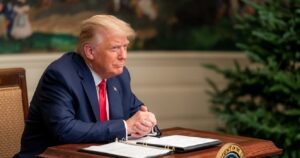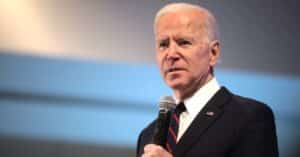Ethics complaint filed against ex-Biden official over EPA funds
A complaint has been lodged against a former Biden White House employee alleging potential conflicts of interest and ethical violations related to a federal funding initiative.
Protect the Public’s Trust (PPT) filed an ethics complaint against David Hayes, a prior climate advisor, claiming he might have violated ethical obligations linked to the Greenhouse Gas Reduction Fund (GGRF).
David Hayes, who rejoined the Coalition for Green Capital (CGC) board in 2023, was targeted by PPT on Friday. The watchdog group accused him of potentially breaching ethics rules when CGC received significant funding from the Environmental Protection Agency's (EPA) GGRF. Billions of dollars were allocated to CGC by the Biden administration in April 2024, sparking concerns about possible misconduct.
Roots of the allegations against Hayes
PPT maintains that the circumstances surrounding Hayes's involvement with CGC warrant questioning. According to PPT's executive director, Michael Chamberlain, the allocation of funds was indicative of a pervasive problem within the administration, which he described as a "Greendoggle." Chamberlain's remarks suggest dissatisfaction with how the fund has been managed, including its connections to the "Biden EPA 'gold bar' scheme."
Additionally, criticism arose when EPA Administrator Lee Zeldin commented on the issue. Zeldin highlighted concerns about certain CGC employees transferring to the Biden White House and subsequently channeling large sums back to CGC. "The Coalition for Green Capital had multiple employees leave their organizations to join the Biden White House," Zeldin noted, condemning the perceived cycle of money and positions.
The GGRF program, designed to reduce greenhouse gas emissions through strategic funding, has come under scrutiny before. Since November 2023, the Department of Justice and the FBI have been actively investigating the fund, including its allocation processes and potential ethical breaches. Consequently, all funds from the GGRF have been frozen until the investigations are resolved.
Jahi Wise, who previously managed the GGRF program, has also attracted attention due to his former ties to CGC. Now employed by George Soros' philanthropic foundation, Wise's past affiliations add another layer of complexity to the ongoing inquiries.
Attempts at addressing ethical concerns
Earlier ethical concerns were brought to light by PPT in June 2024. That complaint contained additional details directed to the Trump EPA and administration, highlighting the bipartisan nature of these ethical investigations. Despite repeated attempts to probe and address these concerns, clarity and resolution remain elusive amid the ongoing inquiries.
Among the concerns, the public and watchdog groups alike question the motivations and transparency of the individuals and organizations involved. "The optics of Mr. Hayes’s entrance into the Biden administration and departure from it are troubling," stated a portion of PPT’s report. This remark underscores the difficulty in navigating the blurred lines between public service and private sector ties.
The Coalition for Green Capital opted not to provide comments on the allegations. Their silence reflects a cautious approach in light of the pending investigations. Nevertheless, the lack of commentary can add to public speculation about the legitimacy of the operations behind the EPA-funded programs.
Still, the call for accountability remains strong. Although the investigations are underway, the GGRF's freezing indicates broader apprehension about compliance and ethical standards. There is commendation for initiatives intending to combat climate change, yet it's crucial that such work aligns with public trust and transparency.
Looking ahead: scrutiny and repercussions
As the investigations progress, the findings could bear significant implications for other government-funded programs. The outcome may lead to reassessments of oversight mechanisms both within the EPA and across other agencies.
Enhanced standards and stricter compliance measures may emerge from these inquiries as pressure mounts to ensure ethical governance and independence from private influences.
The ongoing developments surrounding the GGRF, CGC, and Hayes highlight a critical intersection between policy, ethics, and public perception. With funding initiatives pivotal in climate change response, the integrity of such programs is under close observation. As stakeholders continue seeking clarity, the resolution of this matter could shape future funding governance and public sector relationships.




